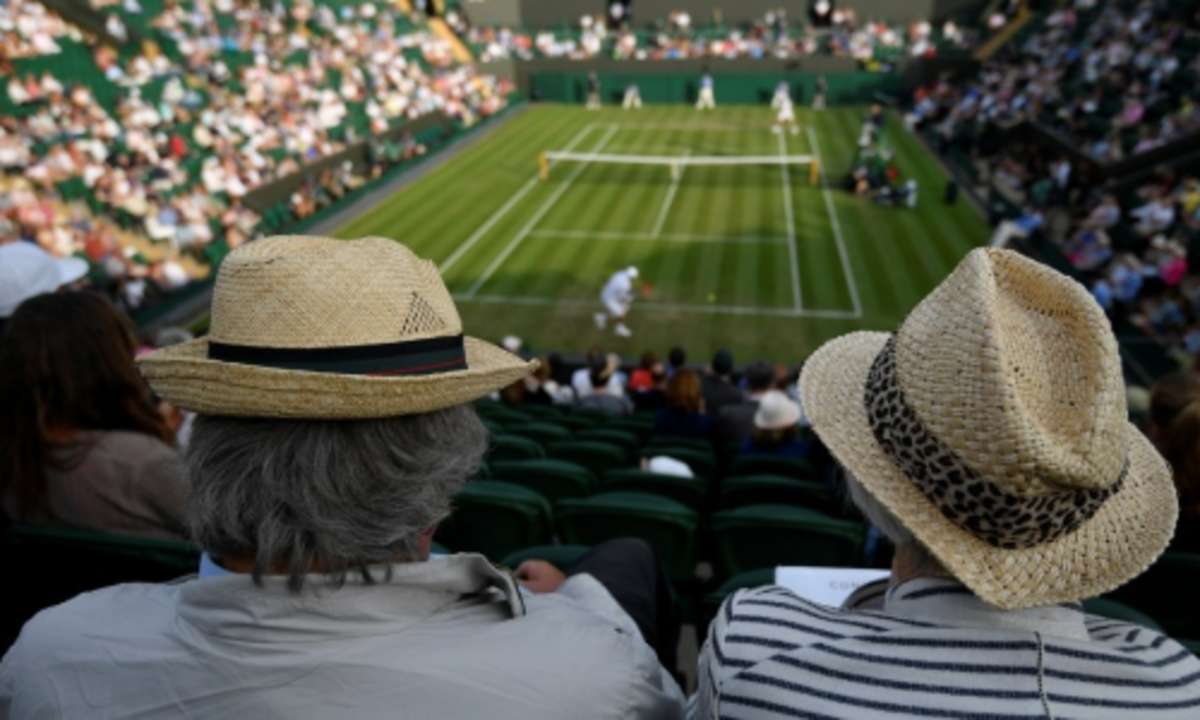
Walk this way: Wimbledon path is tournament's lifeblood

Running straight through the Wimbledon championships, St. Marys Walk is the artery along which nearly 40,000 tennis-goers flow each day; the pulse of the world-famous tournament.
Roughly 500 metres long, the main thoroughfare takes visitors from the heights of Henman Hill, past Centre Court and through the middle of the grounds to the posh hospitality suites at the southern apex.
The axis route starts in the circular orchard right atop the hill, where picnickers escape the hubbub and enjoy the panoramic views over London.
The orchard is ringed by an ornamental pond.
Beyond is the Aorangi picnic terrace, dubbed Henman Hill or Murray Mount, depending on individual taste, where people with the cheaper grounds passes sit and watch the Centre Court action on a giant screen.
The pop of champagne corks blends in with the thud of tennis shots as people tuck into strawberries, sandwiches and crisps. “Lets go! I’m stepping in!” said one man picking his way through the maze of picnic blankets.
On the west side is the charity resale ticket booth, where regular ticket-holders wait to snap up the Centre Court seats of early leavers.
Charlotte, 30, from the northwest outskirts of London, was first in the resale queue, having already queued outside from 4:30am.
“I’ve been doing this every year for 15 years. I just love queueing!” she told AFP.
“I’ve never not got Centre Court tickets. You have to be patient and prepared: sunscreen, water …and prosecco. People think were crazy queueing 11 hours but we love it!”
Down the slope at Court 18, some peer through the slats to glimpse the action.
The plaque on Court 18 commemorates the longest-ever tennis match, where John Isner beat Nicolas Mahut 70-68 in the final set after 11 hours and five minutes in 2010.
“It was absolutely foolish. 70-68!” exclaimed one picture-snapping passer-by.
Next along is Court 14 where people waiting for a seat crane five-deep for a view of the action — unaware that Kate, the Duchess of Cambridge, was sat just metres away.
Opposite, beneath the broadcasters studio windows, sits a grass roller from 1899 that was originally pulled by a horse and remained in use until 1986.
Next down is the media centre terrace. Tennis fans gawp up to see if they can spot players being interviewed on camera, but the back of Dan Evans head garners no recognition.
Opposite, in the northwest corner of Centre Court, is the ball distribution hatch. Ball girls rush off after exchanging old balls for new. More than 50,000 balls come and go during the tournament.
Beneath the bridge between Centre Court and the players enclosure atop the main press room, fans wait, hoping to spot Roger Federer.
The path then drops and opens out between the umpires restaurant and the southwest corner of Centre Court, from whence the smell of fresh laundry mysteriously emanates after dark.
The overhang of Court Three provides the routes only shade. In quieter moments, the competitors can hear the teacups clinking in the players restaurant opposite.
Resplendent in their blazers, a fresh set of eight line judges shelter waiting to start an hour-long shift on Court 4.
The route kinks round the steep Court 12 temporary stand before opening onto a new section of pine decking and picnic tables.
It features a future sustainability zone, answering the big questions like “how will we make plastic circular?” and showing off the electric cars used to transport the players.
In a new fan experience zone, tennis-goers can don virtual reality headsets and have a go at playing on Centre Court.
Saving the best till last, the route ends at the new Rosewater Pavilion — the poshest seats in the house.
Entry costs 5,982 ($7,550, 6,675 euros) per person on men’s final Sunday, but a mere 1,644 on the second Tuesday.
Guests have a four-course a la carte menu overseen by Albert and Michel Roux, Centre Court seats, a free bar and the promise of star visitors.
The luxury is lavish – but way up at the other end of the grounds on the hill, punters seemed to be having just as much fun.

